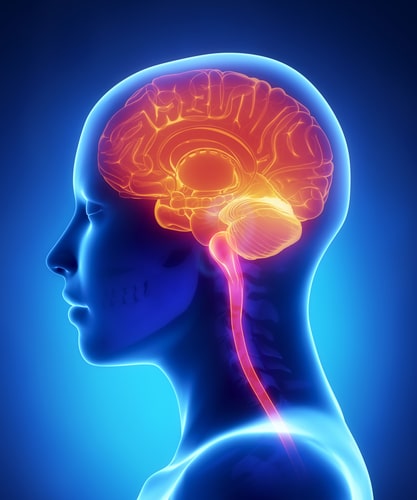
Your hypothalamus not only receives input from appetite hormones like leptin and ghrelin produced peripherally it gets feedback from brain chemicals called neurotransmitters. The hypothalamus integrates information from these sources and uses it to control your appetite. Your hypothalamus serves as the main “control center” when it comes to appetite regulation. If the preponderance of information it receives suggests you’re in an energy-deprived state, it sends hunger signals. If it looks like you’re well fed, it reduces your desire to eat.
Brain Neurotransmitters and How They Impact Appetite
Leptin and ghrelin are two of the best-known regulators of appetite but they’re not the only ones. Leptin is produced peripherally by fat cells and ghrelin comes from cells that line your stomach but they have completely opposite effects, as discussed. Other brain chemicals produced centrally, in your brain also play a role in appetite control. One is a neuropeptide called orexin.
Orexin Turns on Your Appetite
Orexin is produced by cells in your hypothalamus when it senses nutrient depletion. When nutrient and energy stores are low, orexin production by cells in the hypothalamus in your brain increases. Not only does orexin stimulate hunger, it increases wakefulness, making you feel more energetic and motivated to seek out food. It also boosts energy expenditure so you burn more fat. Interestingly, people who have a condition called narcolepsy where they have excessive daytime sleepiness have a deficiency in orexin. They also tend to be overweight or obese. Orexin production is stimulated by another appetite-control hormone, ghrelin.
The Appetite-Regulating Effects of Neuropeptide Y
Another neuropeptide neurotransmitter that influences appetite is called neuropeptide Y. This powerful appetite influencer is produced by the hypothalamus and increases the desire to eat. Not surprisingly, more of this neurotransmitter is produced during fasting and when blood sugar levels fall and less after you’ve eaten a meal. Neuropeptide Y increases cravings for foods high in carbs, especially sugary foods like cookies and ice cream. This makes sense since these foods raise blood sugar levels rapidly. As leptin and insulin levels rise after refeeding, neuropeptide Y levels drop in response.
In animal studies, neuropeptide Y is a very powerful appetite stimulator. Animals injected with this neuropeptide will endure significant discomfort to reach food and overeat sugary foods. This may explain why people who restrict calories too much often end up binging on sweets. Neuropeptide Y is influenced by leptin levels. When leptin levels fall during a fasting state, neuropeptide Y levels go up.
Serotonin is another brain neurotransmitter produced by the brain and also by the digestive tract. It’s linked with mood. People who have low serotonin levels experience mood changes or depression, and some antidepressants work by increasing serotonin levels in the brain. There’s also some evidence that serotonin reduces appetite and the desire to eat, especially for carbohydrate-rich foods. This may explain why some depressed people eat more carb-rich foods.
When people take antidepressants that increase serotonin levels, they consume fewer calories and experience fewer cravings for carby foods. One study showed that serotonin alters pathways in the brain called the melanocortin system that impacts body weight. Some prescription appetite suppressants like the Phen-Fen combination that was taken off the market reduced appetite by increasing serotonin levels.
Gut Hormones Play a Role in Appetite Control Too
We’ve already mentioned two gut hormones, ghrelin, and leptin, that regulate appetite by their effects on the hypothalamus in the brain. There are other gut hormones that help to regulate appetite including cholecystokinin (CCK), produced by cells in the intestine in response to food intake. CCK releases decrease appetite. Interestingly, Korean pine nuts are strong stimulators of CCK and have an appetite-suppressing effect. Sprinkle some on your next salad to get full faster.
Another gut hormone produced by the intestines called GLP-1 or glucagon-like peptide also increases satiety and reduces the desire to eat. Peptide YY made by cells in the intestines and colon has a similar effect. These aren’t neurotransmitters but they play a major role in controlling your desire to eat and how much you eat at a meal.
The Bottom Line?
These are some of the players that work together to control your appetite. They can be impacted by a variety of factors: stress levels, sleep patterns and diet. Plus,
References:
Neuropeptides. 2002 Oct;36(5):303-25.
Ann N Y Acad Sci. 1990;600:521-30; discussion 530-1.
Handb Exp Pharmacol. 2012;(209):349-56.
Science Daily. “New Insight Into How Serotonin Reduces Appetite Could Help In Developing Safer Anti-Obesity Drugs”
Lipids Health Dis. 2008; 7: 10.
Related Articles By Cathe:
Controlling the Munchies: 5 Tips for Taming Your Appetite Hormones
How Too Little Sleep Affects Appetite Hormones?
Leptin: How This Appetite Hormone Affects Your Appetite and Your Weight
What Is Hunger and How Can You Control It?

